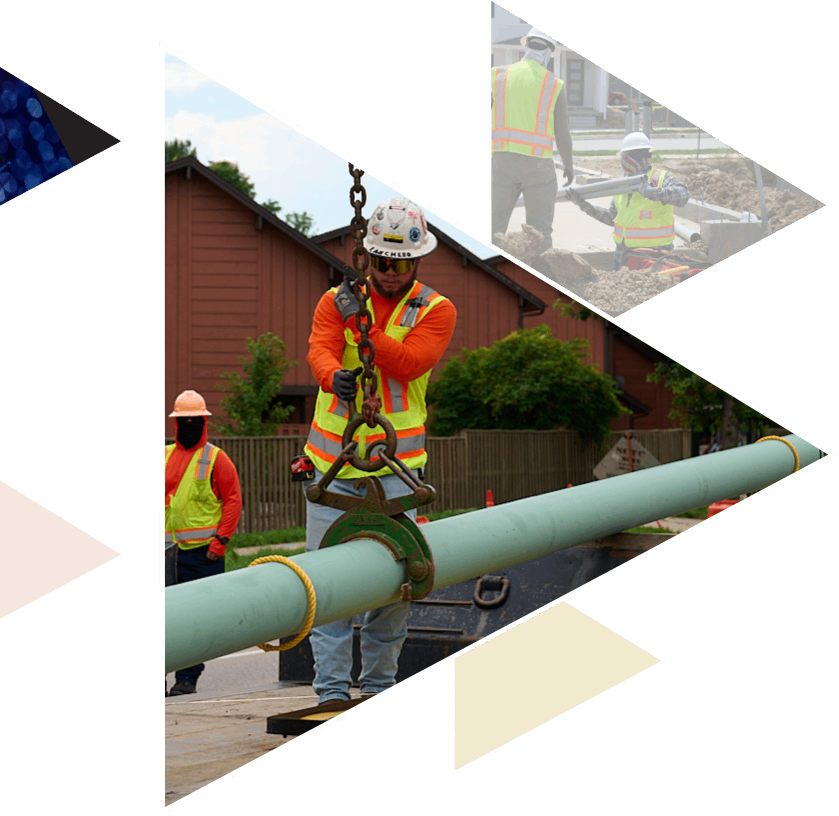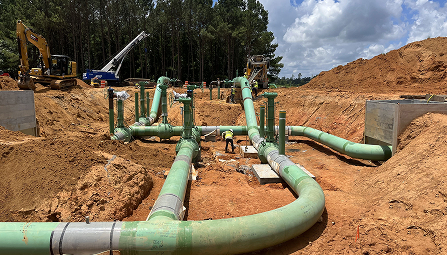Cost Analysis Guide for Pipeline Construction Services Projects
The Essential Guide to Understanding Pipeline Construction Services and Their Value
Pipeline Construction services are fundamental to the transportation of essential resources such as gas, water, and oil. These services involve meticulous preparation and implementation, sticking to stringent security and environmental criteria. As the market adapts to modern-day obstacles, recognizing its implications and elements becomes significantly vital. What aspects contribute to the growing significance of these solutions in today's economic situation? The complying with sections will certainly check out these vital aspects.
Introduction of Pipeline Construction Services
Pipeline Construction solutions include a series of activities crucial for the setup and maintenance of pipelines made use of to carry different materials, consisting of oil, gas, and water. These solutions are important for guaranteeing the secure and effective movement of resources from one area to an additional. The process commonly begins with thorough preparation and layout, which thinks about governing demands, ecological considerations, and logistical obstacles.
Once preparation is complete, excavation and grading of the land are carried out to prepare the website for Pipeline installation. This is followed by the actual laying of the pipelines, which involves welding or joining areas with each other to develop a constant circulation course. After installation, extensive screening is executed to guarantee stability and safety and security. Upkeep services are additionally supplied to resolve any problems that might emerge gradually. Generally, Pipeline Construction solutions play a critical function in sustaining framework for energy and water distribution.
Secret Parts of Pipeline Construction
An effective Pipeline Construction job depends on several essential elements that assure the secure and reliable installment of the Pipeline system. Comprehensive site analyses are critical, as they recognize the ecological and geographical variables that might impact Construction. Next off, the choice of suitable materials, such as pipelines and installations, is necessary for protecting longevity and compatibility with the moved substances.
Moreover, progressed Construction methods, including trenchless technology and directional boring, enhance performance and lessen environmental impact. Reliable job administration is one more important element, collaborating labor, equipment, and timelines to fulfill task goals.
Furthermore, communication amongst stakeholders, consisting of engineers, service providers, and neighborhood authorities, assurances placement on job requirements and needs. Detailed high quality control steps throughout the Construction process make certain compliance with market criteria and maximize the Pipeline's operational life-span. Collectively, these elements create the backbone of an effective Pipeline Construction project.
Safety And Security Standards and Laws in Pipeline Construction

Regulatory bodies, such as the Occupational Safety and Health Administration (OSHA) and the Pipeline and Hazardous Products Safety And Security Administration (PHMSA), stated particular demands that control Construction techniques. These consist of methods for tools usage, employee training, and emergency feedback treatments. By implementing these requirements, Construction business not just shield their employees but also protected public count on. Eventually, extensive security procedures add to the lasting success of Pipeline jobs, ensuring they satisfy both environmental and operational expectations.
Environmental Factors To Consider in Pipeline Projects

Ecological factors to consider are important to the planning and implementation of Pipeline tasks. These jobs need to evaluate potential influences on environments, water resources, and neighborhood wild animals. Carrying out comprehensive environmental effect assessments (EIAs) is vital, allowing stakeholders to determine and reduce threats before Construction starts.
Safeguarding delicate locations, such as wetlands and environments, commonly needs implementing details design attributes or alternative routing to lessen disruption. Furthermore, Pipeline operators are charged with developing approaches for protecting against leakages and spills, which can have destructive results on the environment.
Involvement with regional areas is important, as public problems can result in job modifications that improve environmental protection. Compliance with guidelines established by ecological firms guarantees that tasks fulfill sustainability requirements, cultivating a balance between framework needs and environmental conservation. Ultimately, dealing with ecological factors to consider not only safeguards nature however additionally advertises community count on and task feasibility.
The Function of Modern Technology in Pipeline Construction
Technology plays a necessary duty in modern Pipeline Construction, boosting performance and precision. Advanced evaluating techniques enable accurate planning and implementation, lessening ecological influence and task hold-ups. Furthermore, the combination of automation and robotics streamlines operations, reducing labor costs and improving safety on Construction sites.
Advanced Surveying Techniques
Advanced surveying strategies play an essential role in the successful execution of Pipeline Construction projects. These approaches utilize sophisticated modern technology to assure exact mapping and evaluation of the terrain where pipelines will certainly be set up. Techniques such as Geographic Information Solution (GIS), LiDAR (Light Detection and Ranging), and 3D modeling enable designers to envision and assess click for more the landscape, determining prospective obstacles and ecological worries. By utilizing these innovative devices, teams can enhance precision ready and alignment, significantly reducing the risk of mistakes during Construction. Additionally, real-time information collection enables prompt changes and notified decision-making throughout the task lifecycle. Eventually, these surveying technologies add to boosted performance, safety, and sustainability in Pipeline Construction initiatives.
Automation and Robotics

Economic Effect of Pipeline Infrastructure
Pipeline framework plays an important duty in promoting and forming local economies profession. By offering a dependable ways of transferring oil, gas, and various other assets, pipelines decrease transport costs and enhance supply chain efficiency. This facilities brings in investment, boosts job production, and fosters economic development in bordering areas.
The Construction and maintenance of pipelines contribute substantially to local economic situations, developing various employment chances in numerous industries, from design to labor. The increase of work typically causes raised spending in regional businesses, better bolstering economic task.
In addition, pipelines improve power security by ensuring a stable supply of resources, which is essential for commercial Home Page procedures and residential demands. As areas come to be adjoined with Pipeline networks, they get to wider markets, boosting competitiveness and economic resilience. Consequently, the financial effect of Pipeline facilities is diverse, influencing both immediate neighborhood economic situations and more comprehensive regional growth.
Future Trends in Pipeline Construction Providers
The future of Pipeline Construction solutions is progressing in reaction to technological advancements, governing adjustments, and expanding environmental factors to consider. Advancements such as robotics and drones are enhancing inspection and upkeep processes, boosting security and efficiency. Automation is poised to lower labor prices and raise precision in Construction operations. Furthermore, the boosting focus on sustainability is prompting firms to embrace environmentally friendly materials and methods, aligning with global efforts to lower carbon impacts.
Governing structures are likewise adjusting to resolve environmental influences, promoting better openness and liability in Pipeline projects. The combination of wise technologies, consisting of real-time monitoring systems, is expected to enhance the integrity and efficiency of Pipeline networks. As energy needs change toward sustainable resources, Pipeline Construction solutions will likely see a rise in jobs connected to biofuels and hydrogen transport. Generally, these fads show a transformative period for the Pipeline Construction industry, concentrated on advancement and sustainability.
Regularly Asked Questions
What Types of Pipelines Are Typically Built?
Different kinds of pipelines are frequently created, consisting of oil, gas, sewer, and water pipes - Pipeline Construction Services. Each offers distinctive objectives, helping with the transport of vital sources across regions while sticking to safety and security and environmental guidelines
The length of time Does a Regular Pipeline Task Take?
The period of a regular Pipeline task differs substantially, frequently ranging from several months to a couple of years. Variables affecting this timeline include task complexity, governing authorizations, and environmental factors to consider that have to be attended to.
That Controls Pipeline Construction Companies?
Pipeline Construction companies are managed by different government, state, and regional agencies, consisting of the Pipeline and Hazardous Products Security Administration (PHMSA) and state public energy payments, making certain conformity with security and environmental requirements throughout the Construction process.
What Prevail Products Used in Pipeline Construction?
Common products used in Pipeline Construction consist of steel, pvc, and polyethylene. Each product provides distinct advantages such as resistance, versatility, and durability to corrosion, making them suitable for numerous applications in transferring fluids and gases.

Exactly How Are Pipeline Construction Expenses Approximated?
Pipeline Construction prices are approximated by assessing aspects such as product expenses, labor rates, job complexity, ecological factors to consider, and regulative requirements (Pipeline Construction Services). Accurate expense estimation assurances reliable budgeting and task planning throughout the Construction process
Pipeline Construction services encompass a variety of activities vital for the setup and maintenance of pipelines utilized to transport various substances, including gas, oil, and water. An effective Pipeline Construction project relies on numerous essential parts that assure the effective and secure installation of the Pipeline system. Advanced surveying methods play a crucial role in the effective implementation of Pipeline Construction jobs. Different types of pipes are commonly built, including oil, sewage, gas, and water pipelines. Pipeline Construction prices are estimated by analyzing elements such as material costs, labor prices, task complexity, environmental considerations, and regulatory requirements.